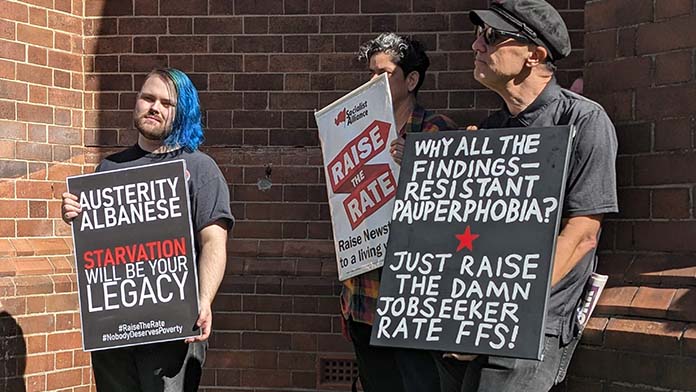Labor’s budget fails workers and the poor so it can keep big companies, the military and the rich all on side.
This budget will do nothing to fix any of the crises working class people face—from the housing and rental disaster, the dire state of hospitals, JobSeeker payments that condemn over a million people to poverty or the threat of climate catastrophe. It provides minor cost of living relief only to those living in outright poverty on government payments.
Labor is using the claim that more spending would fuel inflation to wave away these urgent needs.
But at the same time it is shovelling out money and tax breaks for the super rich and their inflationary profits while denying workers and the poor the urgent relief needed to keep up with the cost of living crisis.
It refuses to take money from the military or tax the rich to fund the spending needed.
Military spending is set to surge—increasing 7 per cent to over $52.6 billion next year alone, with the nuclear subs costing up to $58 billion over the next ten years, a down payment on the eventual cost of up to half a trillion dollars.
There is $4.1bn for long-range missiles and another $3.8bn to expand military bases in northern Australia over four years. The government clearly sees a dangerous arms race with China as more of a priority than the cost of living, climate action, or ending poverty.
The appalling Stage Three tax cuts for the rich will cost $69 billion over just the next four years—although the government tried to hide this by keeping it out of the budget papers. That’s four times the total Labor is spending on all its cost of living measures combined, including welfare payments, Medicare spending and energy bill measures.
The money is there
The small budget surplus should blow Labor’s claims that more spending is unaffordable out the window. Just over $150 billion in extra revenue has come in beyond what was expected in October due to higher company profits and income tax. But Labor will put most of into paying off debt.
It says there is still a funding problem in future years. But the surging revenue shows what could be done if Labor was serious about taxing the rich. It’s not just its commitment to the Stage Three tax cuts. Even when it admits there is tax avoidance its response is pathetic.
Gas companies are making obscene profits due to sky-high international gas prices. Last year they made extra windfall gains of up to $40 billion. But the Petroleum Resource Rent Tax is so useless it barely increased.
Labor’s change will see it bring in $2.4 billion more over the next four years or “$600 million a year—chicken feed”, as Nine’s Ross Gittins put it. Gas companies won’t even end up paying any more, with the changes simply bringing forward tax they would have paid in later years. Changes proposed by The Greens could have raised $33.8 billion in four years. No wonder the gas companies aren’t complaining.
Superannuation tax breaks that mostly benefit the top 20 per cent of income earners cost the budget $45 billion a year. But Labor’s changes only affect the wealthiest 0.5 per cent, and raise only $2.3 billion a year—and that’s not until they comes fully into force in five years.
The funding increases it has announced go nowhere near far enough.
The cut to single parent payments made under the Gillard Labor government will be partially reversed, with single parents able to access higher payments until their child turns 14, up from eight now. Originally they lasted until children were 16.
After trying to bat away calls for an increase to JobSeeker from its economic inclusion committee a few weeks ago, the government has blinked. But the increase of just $20 a week still leaves those on the payment deep in poverty. JobSeeker will rise by $2.85 a day, from just 41 per cent of the minimum wage to 45 per cent—not much to celebrate. Rent assistance will also increase by about $15 a week.
Those over 55 get a slightly better deal, with $46 more a week, if they have been on the payment for over nine months.
This is more about dampening political pressure on the government than seriously addressing poverty. But it does show that campaigning can work. A renewed wave of angry protests demanding that Labor raise the rate could force further increases.
There is more money for Medicare, with $4.6 billion to encourage bulk billing, targeted at children and welfare recipients. But hospitals missed out on any extra funding.
On climate, Labor’s biggest new measure is a business subsidy—$2 billion to develop a hydrogen industry via payments per kilogram produced. The funding for household energy upgrades to help cut emissions promised last year, through electrification, solar panels or energy efficiency measures, come to just $300 million for social housing and $1 billion in loans for other households.
Yet there is still an appalling $41 billion for fossil fuel subsidies.
Despite its promise to increase the refugee quota to 27,000 places, the government has failed to allocate any funding or timeline to do so. It has found $1 billion for Brisbane’s 2032 Olympics Games and $240 million for a new stadium in Hobart. Yet the urgent call for an extra $250 million over two years from Aboriginal Legal Services was ignored—even as they have already been forced to suspend services in three courts in NSW.
None of the posturing about “getting the balance right” can disguise the fact that Labor’s priority is to appease profit-hungry corporations and the rich. This budget needs to fuel a fightback—it shows that the money to fund climate action, welfare people can live on, as well as proper services and cost of living relief is there for our taking.
By James Supple






